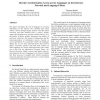Free Online Productivity Tools
i2Speak
i2Symbol
i2OCR
iTex2Img
iWeb2Print
iWeb2Shot
i2Type
iPdf2Split
iPdf2Merge
i2Bopomofo
i2Arabic
i2Style
i2Image
i2PDF
iLatex2Rtf
Sci2ools
HICSS
2006
IEEE
2006
IEEE
Barriers to Information Access across Languages on the Internet: Network and Language Effects
This paper investigates the role of language in accessing information on the Internet. We combined data about website visitors through log-file analysis with data about web-hosts and links obtained from a crawler. Results suggest that language may represent a double barrier: first, the number of native speakers determines the number of web-hosts, and hence the amount of information and the interconnectedness of information sources. Second, to access information on a particular website the languages offered are an even more important factor than network effects: non-native speakers and links from websites in other languages are always underrepresented. Our results are in line with the Information Foraging Theory, the Revised Hierarchy Model, network and market theories, and emphasize the role of language on the Internet. Insight into these processes is helpful when website translation represents important investment decisions, or when aiming to diminish the digital divide.
| Added | 11 Jun 2010 |
| Updated | 11 Jun 2010 |
| Type | Conference |
| Year | 2006 |
| Where | HICSS |
| Authors | Anett Kralisch, Thomas Mandl |
Comments (0)

